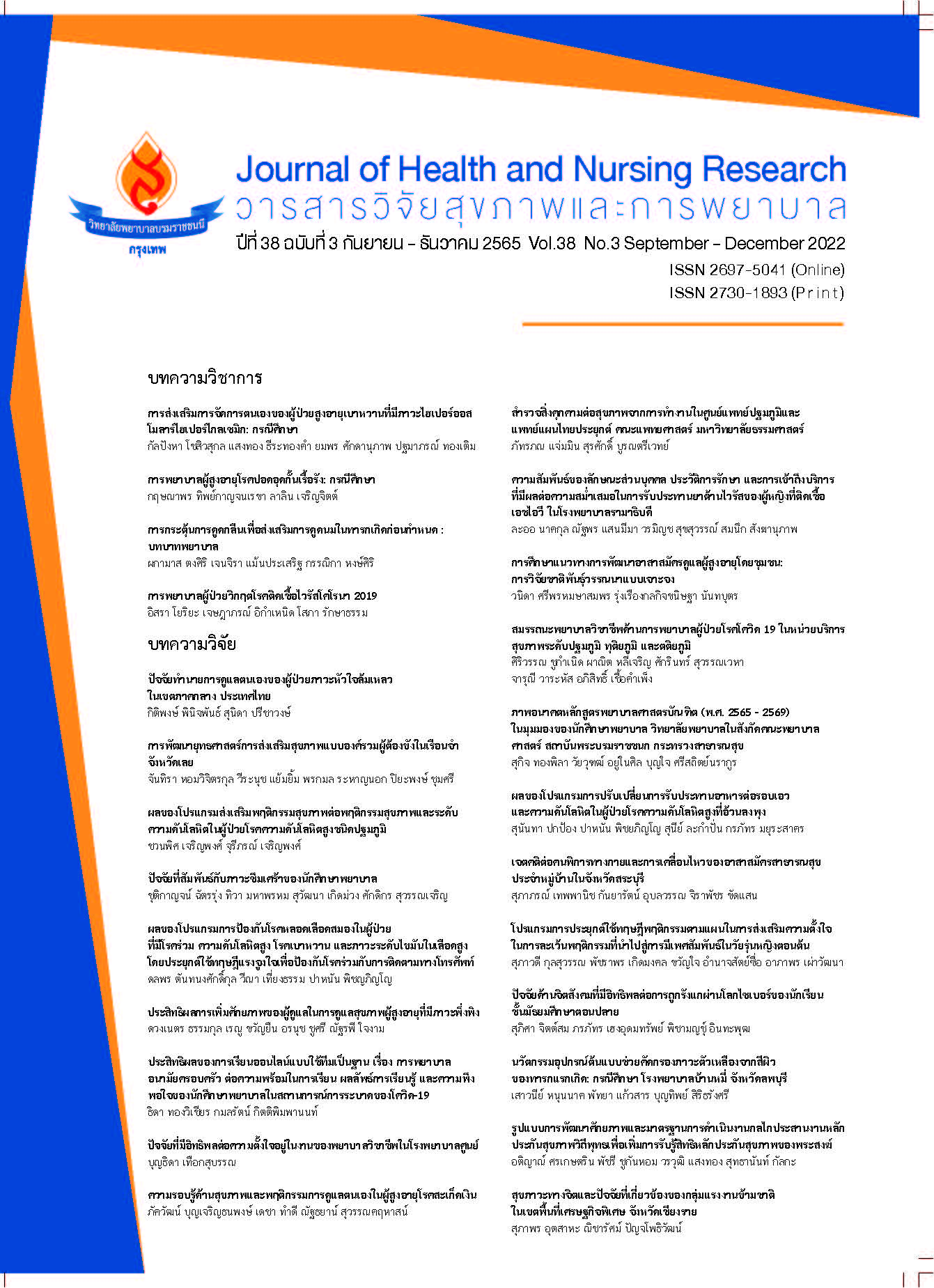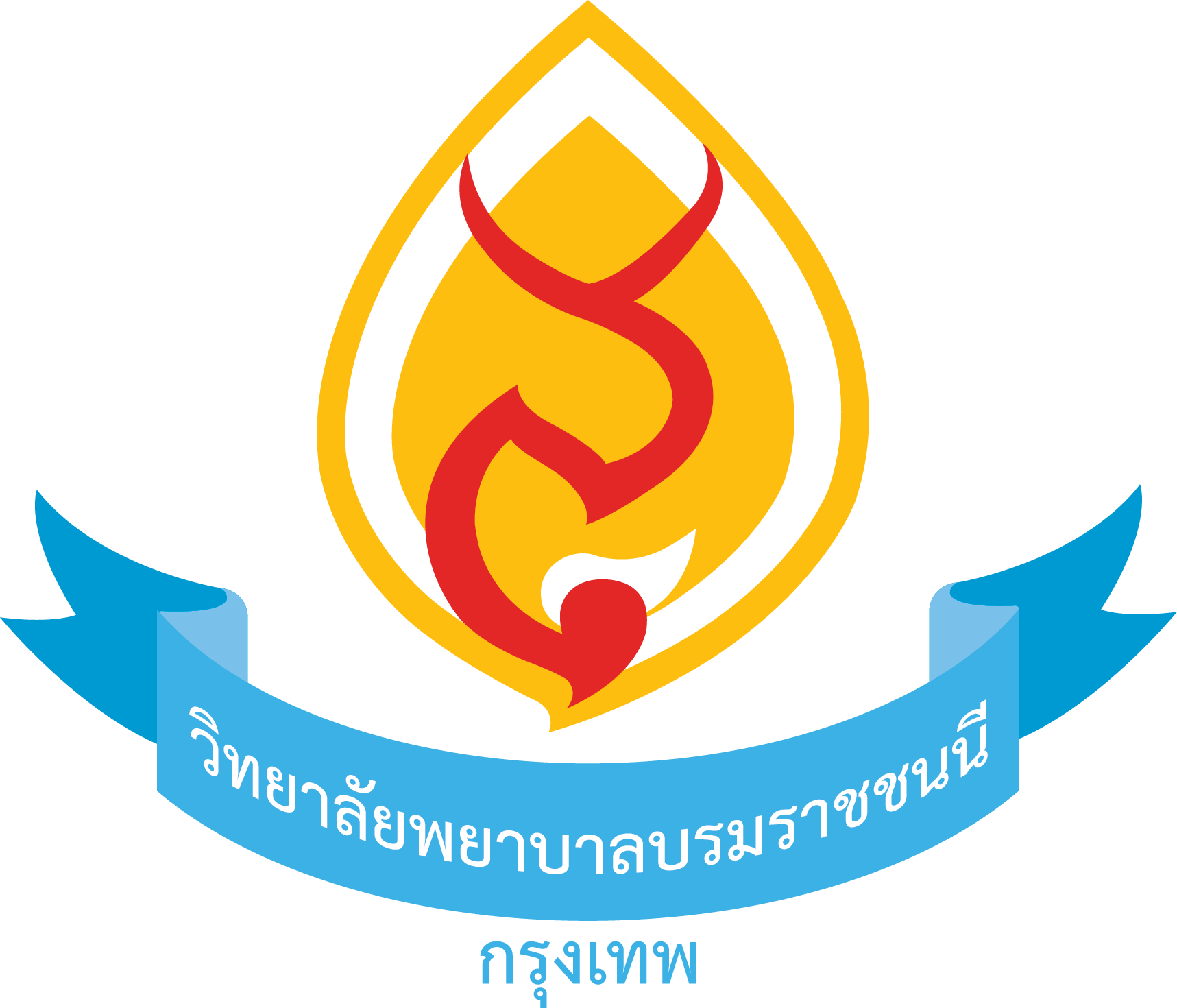Factors Predicting Self-Care of Patients with Heart Failure in Central Region, Thailand
Keywords:
self-care, patients with heart failure in central regionAbstract
Introduction: Self-care is highly-recommended for patients with heart failure (HF). Despite certain self-care programs were developed for them, most HF patients are unable to effectively manage factors influencing their illness.
Research objectives: This study aimed to identify predictive factors related to self-care in patients with HF in Central Region, Thailand.
Research methodology: This study used a descriptive-predictive design. A simple random sampling technique was used to recruit 185 patients with HF from 3 hospitals in the central region, Thailand. The selected factors included 1) health belief, 2) health survey, 3) illness perception, 4) self–efficacy, 5) knowledge of HF, and 6) cardiac function. Data were collected using the self-reported questionnaires, and the personal health record. Data were analyzed using descriptive statistics, and multiple regression analysis.
Results: Findings revealed that the overall self-care of patients with HF was at a fair level. Health belief, self-efficacy, and knowledge of HF were positively associated with self-care (r = .377, .430, and .349, respectively). Illness perception was negatively related to self-care (r = -.279). Cardiac function, and health status were not related to self-care. Moreover, self-efficacy, and knowledge of HF could significantly predict 23 percent of the variance of self-cares (R2 = .230, p = .001). Results of multiple regression analysis revealed that self-efficacy, and knowledge of HF together explained 23.0% (R2 = .230, p = .001) of the variance in self-care.
Conclusions: Self–efficacy was the strongest predictor for self-care in patients with HF (ß = .351, p = .001), followed by knowledge of HF (ß = .226, p = .001).
Implications: Findings can be used to develop nursing activities that focus on promoting self-care with less limitations for patients with HF to attain appropriate and continuous self-care.
Downloads
References
Jompaeng Y, Korcharoenyos C, Koteprom J. The innovation of JVP. Journal of Health and Nursing Research. 2019;35(2):109-17. (in thai)
Wattanune N. The Factors Influencing to health-related quality of life amongst the patients with congestive heart failure at a community in Kanchanaburi province [Community Nurse Practitioner’s thesis]. Nakhon Pathom: Christian University; 2012. (in Thai)
Riegel B, Driscoll A, Suwanno J, Moser DK, Lennie TA, Chung ML, et al. Heart failure self-care in developed and developing countries. Journal of cardiac failure. 2009;15(6):508-16.
Sedlar N, Lainscak M, Martensson J, Strömberg A, Jaarsma T, Farkas J. Factors related to self-care behaviours in heart failure: a systematic review of European heart failure self-care behaviour scale studies. European Journal of Cardiovascular Nursing. 2017;16(4):272-82
Riegel B, Lee CS, Dickson VV. Self care in patients with chronic heart failure. Nature reviews cardiology. 2011;8(11):644-54.
Roger VL, Go AS, Lloyd-Jones DM, Adams RJ, Berry JD, Brown TM, et al. Heart disease and stroke statistics-2011 update: a report from the American Heart Association. Circulation. 2011;123(4):e18-e209.
Riegel B, Dickson VV, Faulkner KM. The situation-specific theory of heart failure self-care: revised and updated. Journal of cardiovascular Nursing. 2016;31(3):226-35.
Ok JS, Choi H. Factors affecting adherence to self-care behaviors among outpatients with heart failure in Korea. Korean Journal of Adult Nursing. 2015;27(2):242-50.
Hwang B, Moser DK, Dracup K. Knowledge is insufficient for self-care among heart failure patients with psychological distress. Health Psychology. 2014;33(7):588.
Graven LJ, Grant JS, Vance DE, Pryor ER, Grubbs L, Karioth S. Predicting depressive symptoms and self-care in patients with heart failure. American journal of health behavior. 2015;39(1):77-87.
Goodman H, Firouzi A, Banya W, Lau-Walker M, Cowie MR. Illness perception, self-care behaviour and quality of life of heart failure patients: a longitudinal questionnaire survey. International Journal of Nursing Studies. 2013;50(7):945-53.
Peters-Klimm F, Freund T, Kunz CU, Laux G, Frankenstein L, Müller-Tasch T, et al. Determinants of heart failure self-care behaviour in community-based patients: a cross-sectional study. European Journal of Cardiovascular Nursing. 2013;12(2):167-76.
Baghianimoghadam MH, Shogafard G, Sanati HR, Baghianimoghadam B, Mazloomy SS, Askarshahi M. Application of the health belief model in promotion of self-care in heart failure patients. Acta Medica Iranica. 2013:52-8.
Angkulkhajorn S. The effect of health promoting program applying pender’s model on treatment adherence In adult patients with heart failure [Adult Nursing’s thesis]. Bangkok: Chulalongkorn University; 2013. (in thai)
Kasemsup V, Sakthong P, Poopha K. The project "surgery on 8,000 hearts of dedicated to the 80th Birthday of King Bhumibol Adulyadej and Dedicated to the 84th Birthday of of the 84th birthday of Her Royal Highness Princess Galyani Vadhana Krom Luang Naradhiwas Rajanagarindra ". Nonthaburi: National Health Security Office; 2007. (in thai)
Olanwat K. Selected factors related to depression in aatients with acute coronary syndrome, general hospital [Nursing Science’s thesis]. Bangkok: Chulalongkorn University; 2018. (in Thai)
Srisuk N, Wattanasrisin J, Tepapal T. Factors related to quality of life of caregivers among patients with heart failure in Trang Province. The Southern College Network Journal of Nursing and Public Health. 2017;4(Special Issue):317-31. (in Thai)
Riegel B, Lee CS, Dickson VV, Carlson B. An update on the self-care of heart failure index. The Journal of cardiovascular nursing. 2009;24(6):485.
Suwanno J, Petsirasan R, Praseartthai P, Chanpradit A, Saisuk W. Self-care among patients with chronic heart failure. Thai Journal of Nursing Council. 2008;23(1):35-47. (in Thai).
Suwanno J, Petsirasan R, Suwanno J, Saisuk W, Chanpradit A. Age and heart failure self-care: a comparison of self-care maintenance between eldery and adults. Songkla Med J. 2009;27(4):335-46. (in Thai)
Choknumchaisiri k. Influences of health status, knowledge of heart failure, and social support on self-care behaviors in patients with heart failure [Adult Nursing’s thesis]. Chonburi: Burapha University; 2011. (in thai)
Ma C. An investigation of factors influencing self-care behaviors in young and middle-aged adults with hypertension based on a health belief model. Heart & Lung. 2018;47(2):136-41.
Dehghani-Tafti A, Mahmoodabad SSM, Morowatisharifabad MA, Ardakani MA, Rezaeipandari H, Lotfi MH. Determinants of self-care in diabetic patients based on health belief model. Global journal of health science. 2015;7(5):33.
Huong PTT. Predicting factors of self-care behaviors in Vietnamese adults with heart failure [Nursing Science’s thesis]. bangkok: Chulalongkorn University; 2015. (in Thai)
Rockwell JM, Riegel B. Predictors of self-care in persons with heart failure. Heart & Lung. 2001;30(1):18-25.
Downloads
Published
How to Cite
Issue
Section
License
Copyright (c) 2022 Journal of Health and Nursing Research (Journal of Boromarajonani College of Nursing, Bangkok)

This work is licensed under a Creative Commons Attribution-NonCommercial 4.0 International License.
Article published Is the copyright of the Journal of Health and Nursing Research (Boromarajonani College of Nursing, Bangkok) Cannot be republished in other journals


















